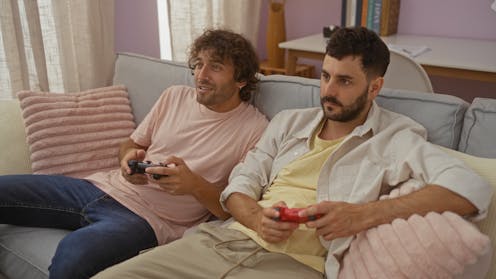Does conflict with friends make you squirm? Doing it right might make the relationship stronger
- Written by Raquel Peel, Research Supervisor, University of Technology Sydney, Adjunct Senior Lecturer, University of Southern Queensland and Senior Lecturer, University of Notre Dame Australia

Some friendships outlast romantic connections and can prove to be more meaningful. Friends help us get through day-to-day challenges and make the tough stuff more bearable. For older people, a close circle of friends is associated with living longer[1].
But having close friends can also involve conflict and even break-ups. Breaking up with a friend[2] can be as devastating as breaking up with an intimate partner.
For most of us, friendship is the first close relationship we will form outside of the home environment. Learning to communicate and manage conflict with friends starts in childhood[3], and shapes our personal and social development[4], as well as our self-esteem[5].
So how can deal with conflict in adult friendships in a healthy way[6]? And how do you know if it’s time to call quits on the friendship?
How is conflict different in friendships?
Relationships with friends are often seen as needing less work to maintain[7] than other kinds of relationships. They might be less structured than work relationships and less involved than romantic relationships. The dynamic of our friendships is often very different to how we relate to work colleagues and romantic partners.
Some of the characteristics[8] we display with friends might be also very different to how we behave with others. Male friendships, for example, often involve using insults[9] to show a close bond. For some people, it can be difficult to transition to a relationship where you can be yourself, be vulnerable and have difficult conversations.
Having these deeper conversations with friends means conveying concern, empathy and solidarity. Again, this might look different than in other relationships, especially among men, who often opt for a direct approach[10] when communicating with friends. A direct approach is a way of showing concern, but might sound like an interrogation.
It’s also important to be able to regulate our emotions[11]. This means being able to recognise, manage and respond to your own emotions (such as anger or envy), allowing you to de-escalate situations and avoid conflicts getting out of hand. Research has shown[12] people with better emotional regulation tend to be more popular, have more friends and are more successful maintaining long-term friendships.
Are you ready to forgive?
If you’ve been fighting with a friend and want to repair the relationship, you will need to be open to forgiveness[13]. This will help restore[14] connection, security, happiness and meaning in your relationship.
But people’s willingness to forgive differs[15] across gender and personality types, with some being more willing to forgive than others.
Our willingness to forgive will also depend on how we perceive the issue. Active transgressions[16] (such as physical altercations, insults, lies and gossip) are often perceived as more severe and harder to forgive than passive transgressions[17] (such as failing to act by not apologising).
However, if an interaction with a friend has left you feeling mistreated (physically or emotionally), consider[18] what you are willing to stand for or let go. Weighing-up[19] if the value of the friendship warrants the work to maintain it can be very difficult.
In some cases, conflict might be a result of you outgrowing[20] the friendship. Letting the connection go might be better for your mental health.
I want to repair my relationship with my friend. But how?
Before you repair a relationship[22], you first need to acknowledge your own feelings, your friend’s experience, and how the interaction has affected the relationship.
When bringing up your grievances with a friend, initiate a conversation about the issue with honesty, discuss the issue in context and find a way forward together, using these core tenets:
Connection
Intimacy in friendships[23] means having honest conversations and spending quality time together. Ask your friends real questions and give them honest advice. With a foundation of open communication, you can solve disagreements and differences when they arise.
Communication
Forming authentic friendships involves taking risks and feeling vulnerable[24].
Express your own feelings and views using “I feel like” statements[25] rather than blaming the other person with “you do this” or “think that” statements. Instead, show empathy and acknowledge your friend’s perspective.
Forgiveness
When you’re ready, asking for and granting forgiveness can be a powerful way to reconnect[26]. You can do this verbally or non-verbally, such as with a hug.
But try not to negotiate conditions (“I will forgive you when…”). This might be a sign you’re not ready yet.
Boundaries
If a friendship is hurting you, affecting your wellbeing[27] and functioning, it may be beyond repair. Feeling physically unsafe or being subject to verbal abuse or manipulation are signs of victimisation[28], not healthy conflict. Consider creating distance and seeking support elsewhere from people you can trust.
References
- ^ living longer (pmc.ncbi.nlm.nih.gov)
- ^ Breaking up with a friend (journals.sagepub.com)
- ^ starts in childhood (www.igsspublication.com)
- ^ personal and social development (journals.sagepub.com)
- ^ self-esteem (www.frontiersin.org)
- ^ healthy way (psycnet.apa.org)
- ^ needing less work to maintain (bristoluniversitypressdigital.com)
- ^ characteristics (journals.sagepub.com)
- ^ using insults (psycnet.apa.org)
- ^ direct approach (psycnet.apa.org)
- ^ regulate our emotions (www.frontiersin.org)
- ^ Research has shown (www.frontiersin.org)
- ^ forgiveness (www.tandfonline.com)
- ^ restore (pmc.ncbi.nlm.nih.gov)
- ^ differs (www.tandfonline.com)
- ^ Active transgressions (psycnet.apa.org)
- ^ passive transgressions (psycnet.apa.org)
- ^ consider (www.tandfonline.com)
- ^ Weighing-up (bristoluniversitypressdigital.com)
- ^ outgrowing (www.tandfonline.com)
- ^ PeopleImages.com - Yuri A/Shutterstock (www.shutterstock.com)
- ^ repair a relationship (bristoluniversitypressdigital.com)
- ^ Intimacy in friendships (www.czasopisma.uni.lodz.pl)
- ^ taking risks and feeling vulnerable (psycnet.apa.org)
- ^ using “I feel like” statements (www.relationshipsnsw.org.au)
- ^ powerful way to reconnect (www.tandfonline.com)
- ^ affecting your wellbeing (link.springer.com)
- ^ signs of victimisation (journals.sagepub.com)

















